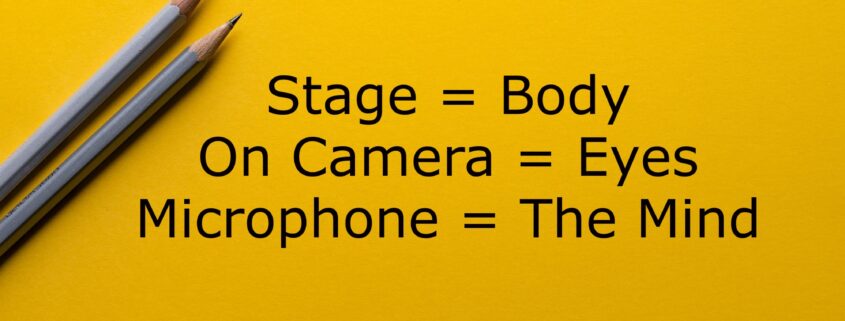From an Actors Standpoint: The Body; The Eyes; The Mind
From an Actors Standpoint
Stage = The Body; On Camera = The Eyes; Microphone = The Mind
Stage acting is about the body and voice – and On Camera, acting is about the face and the eyes. From that perspective, Voice Acting is about the theater of the Mind. What you can do at the mic is limitless because it is all about playing within the imagination. So are the listeners if your imagination is activated when reading or interpreting a character. You can be almost anything behind the microphone – and your appearance does not restrict you.
When acting on screen, an actor needs to focus more energy on the Camera than the average person might think. Unlike an audience of theatre-goers, the Camera will focus on the most microscopic and intricate expressions, including something as minute as an eyebrow twitch or a slightly clenched jaw. For this reason, the actor must always be conscious of where the Camera is positioned and perform by how it will look on screen, paying particular attention to their face and eyes.
However, you use your entire body and voice to communicate emotion on stage. Vocal projection and inflection are of utmost importance so that even the audience members sitting in the back row can hear and understand everything you’re saying.
Similarly, using your entire body to translate even the slightest emotion is critical to every stage actor’s repertoire. The physical movement must be exaggerated – even something as simple as standing needs attention to detail. The actor must be conscious of every physical detail to project each emotion.
Now when it comes to voice acting – you no longer have the visual performance of the facial expression you did on Camera – now becomes an added sound to the text.
In Voice Acting in animation or video games, your characters must be grounded to someone – and a voice actor must add sounds to the characters’ speech text to reveal their inner dialog. Voice Actors need to ‘invite the listener’ – into their imagination. The only limit in Voice Acting – is your imagination. You can go anywhere or be anything you can imagine, as there is no visual to your performance at the mic.
There may be an added visual or animation – but the voice actors’ performance is limitless where the imagination can take you. Often the best voice acting performances INVITE THE LISTENER into the actor’s mind to become them by using internal and external energies and going back and forth between them.
Wanna learn more and put all this into practice at the mic? Come back to class and bring your imagination.
Paul Liberti
https://paulliberti.com/
https://www.facebook.com/groups/VoiceOverTuneUp


